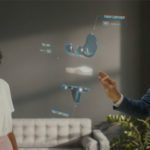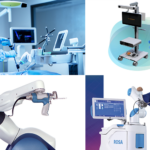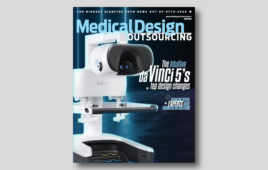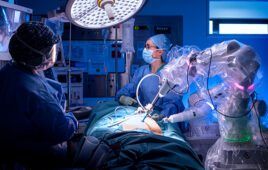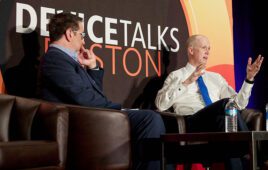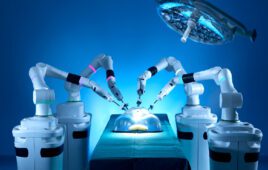
Ivan Tornos is the chief operating officer of Zimmer Biomet. [Photo courtesy of Zimmer Biomet]
DeviceTalks Editorial Director Tom Salemi spoke with Tornos, chief operating officer of Zimmer Biomet, about the company’s broad technology offerings including its ZBEdge, Persona IQ smart knee implant and other digital data collectors.
Tornos joined the Warsaw, Indiana-based company in November 2018 as president of the orthopedics group, became group president of global business and the Americas in 2019 and was promoted to serve as chief operating officer — a new position at Zimmer Biomet — in March 2021.
Go to DeviceTalks.com to hear the entire conversation. (We’ve edited the following excerpt for brevity and clarity.)
DeviceTalks: As chief operating officer, what are your responsibilities?
Tornos: There’s pretty much four key areas: Strategy, operations, culture and innovation.
On the strategy front, which is 90 percent of my time, I am tasked to transform the company with a group of people from being historically a metal and plastic company to what we call a customer-centric solutions leader. We want to move from selling implants to solving problems. We know this space very well. We have all kinds of programs in orthopedics, whether it is the outcomes not being what patients deserve, whether it is the inefficiency in the surgical episode of care, whether it is just the overall high cost that still you see in the episode of care. We want to be a solutions leader in solving the problems through our technology, through our implants, through our data and all the elements of our ecosystem.
When it comes to operations, I pretty much think of myself as the person responsible to make sure that we drive a very efficient operation here at Zimmer Biomet. We’ve got 23,000 employees across 125 different countries. I want to make sure that we run Zimmer Biomet globally like a startup. I want us to move with speed in the way we operate. I’ve seen that happen in other large companies. And I think of myself as a person that is going to induce that speed in the way that we operate.
The third one, which is probably the most important one, is culture and talent. I like to think of myself as a global cheerleader of the company, someone who’s daily inspiring this notion of winning every day in the marketplace for patients, primarily. I spend a large amount of time meeting people that joined the company, developing people as well as hiring people, really driving the message of why we do what we do, talking about our mission.
And then the fourth and final area of responsibility is innovation, which is very exciting. We’ve gone through some challenges in the past. The last three years, innovationwise, have been phenomenal. We’re going to be launching close to 50 new products over the short- to mid-term. We have moved our R&D investments from implants to technology, so 70% of all the money that we invest today, you’ve seen in robotics technology and applications beyond the implant.
DeviceTalks: Between the robotics, ZBEdge and Persona, it’s sounding less like an orthopedic company and more like a hybrid of tech and orthopedics. I’m guessing that’s how you see things as well?
Tornos: 100%.
DeviceTalks: Let’s get into those different areas. Let’s start with Persona. What does it bring to the orthopedics channel?
Tornos: At Hospital for Special Surgery, we inserted the very first smart implant in the world of orthopedics – and I say that with a lot of pride. It’s the very first smart implant, the only FDA-approved smart implant in orthopedics is Persona IQ. The simple way to describe this is a sensor from Canary Medical goes into the tibial extension of the actual implant and post-surgery, it starts to measure things. And what you measure is going to be highly scalable. We measure things like range of motion, step down, walking speed, the quality of your walk, what we call gait metrics.
Beyond that, it’s going to start measuring many other things. We strongly believe at some point, we can measure things such as movement of the implant, potential risk of friction, temperature and many other things. It’s also going to also feed data, not only to the patient, but to the actual physician.
DeviceTalks: Why is this data important? How do you ensure that the data is accessed, monitored and used by the physicians? Are they accustomed to tracking data and checking the data that come from the sensors? How do they come to use data in their everyday lives?
Tornos: The patient and the physician will have access to that data. With the data, I can understand range of motion after the surgery, level of physical therapy, potential risk of readmission and complications. Years from now, you can get alarm bells — is that, is that implant moving, causing infection and other problems? How you feel is very subjective [versus] very quantitative data points in terms of how biomechanically your implant is moving. What do you do with the data later on? You kind of start to really see what is the best time and the best implant for a given patient. You start getting into all kinds of predictive analytics, intentionally redesigning implants, what are things that work or don’t work.
DeviceTalks: Let’s move on to the ZBEdge platform.
Tornos: ZBEdge is our ecosystem of solutions. It encompasses all kinds of solutions: hips, knees, shoulders, robotics, smart implants. What makes ZBEdge unique is that every single component of this ecosystem either gathers data or feeds data.
DeviceTalks: How does ZBEdge present to the world? What does it look like?
Tornos: ZBEdge has amazing implants. Those get augmented by the data capabilities around the implant. Those get augmented by the fact that we’re able to feed — through robotics — data intracase to that surgeon to see what is the best implant, how is it going to perform, the anatomy of that patient, the biomechanics, and all of that. So you’re getting data combined with implants to get a dashboard that has all kinds of dynamics.
DeviceTalks: Where does Rosa robotics fit into the infrastructure?
Tornos: We’re not a robotics company. I see ourselves as a technology company. One of those ingredients in that ecosystem that I keep talking about is robotics. What I like about Rosa is that it interconnects with other parts of the ecosystem. Very excited about it, but no, it’s not the one core component – it’s one of a few. We have four robotic applications today: We’ve got the brain application, spine, knees and hips.
DeviceTalks: Let’s look ahead. What’s gone into changing the culture of the company from orthopedics to technology? And where do you see things going forward? What does Zimmer Biomet look like in four or five years?
Tornos: Zimmer Biomet is going to be the boldest medtech company in the world. And that’s not a hyperbolic statement. We’ve made a very strong bet in making sure that is the vision. How do you define boldest? We’re going to be No. 1 in solving the problems in orthopedics. We want to drive the most efficient surgery with the best outcome, the safest outcome for the patient. I want to make sure that we do our job when it comes to lowering the cost of care. That’s how we define being the boldest.
In 2026, people will look back and say, “These guys really did become the problem solvers and the customer-centric solutions leaders in orthopedics.”
We’re going to continue to look for all kinds of opportunities within technology. We’ve seen data. We’ve seen process excellence while we continue to innovate best-in-class devices.
How do we align the culture of the organization to that? One of the things that is so striking about orthopedics is that things change slowly. How do we make sure that we move our culture in that direction of being the boldest medtech company in the world? It’s a combination of really expanding the “why” every day to our organization and to educate our sales team on the fact that an implant is no longer going to be the way to solve a problem. It is part of the solution, but it’s not the only solution. It’s really training. We are certifying every single one of our thousands of reps in terms of why robotics, technology and data need to be part of the solution. I think people by seeing the results, they’ll jump on the journey. The team, the organization from a cultural standpoint, is fully on board with the journey that we have embarked upon. And I’ll tell you that already from a cultural standpoint today, we have a totally different culture at Zimmer Biomet than we did just three years ago.

